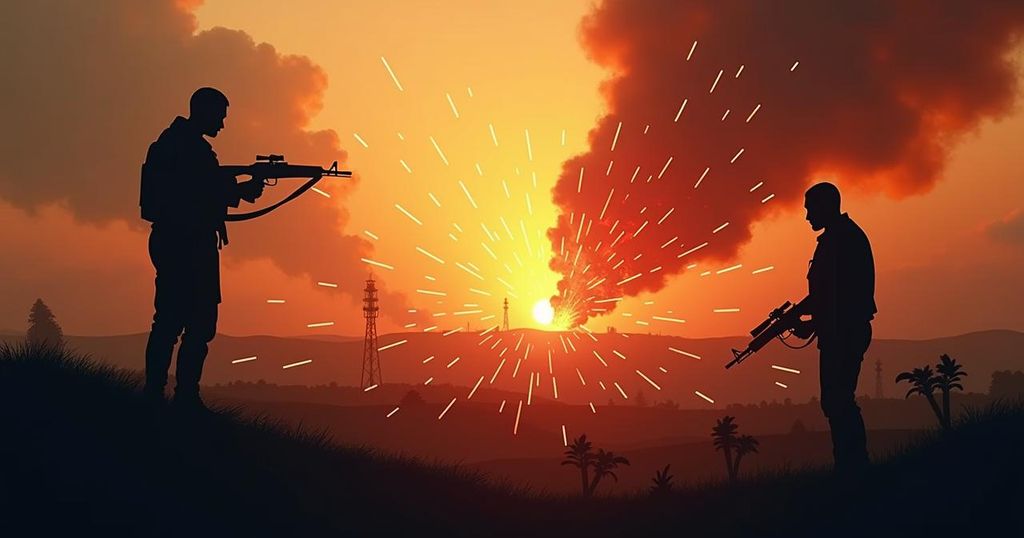Israel and Iran are nearing a potentially catastrophic war following Iran’s missile attack targeting Israeli installations. This attack, which was in retaliation for the assassinations of key leaders in Iranian proxy groups, signals a heightened level of aggression between the two nations. Despite most missiles being intercepted, the implications for regional stability are profound, with both sides preparing for further military escalations.
Tensions between Israel and Iran have escalated dramatically following a significant missile attack orchestrated by the Iranian Revolutionary Guard Corps, which released approximately 180 missiles targeting Israeli sites including air force bases and the Mossad headquarters. The attack was framed as retaliation for the recent assassinations of key figures in the Iranian-backed factions. Although most missiles were intercepted by collaborative defense efforts from Israel, the United States, and Jordan, several did manage to strike both military and civilian areas, leading to limited damage and minor casualties. This incident marks a dangerous juncture in the already volatile landscape of Middle Eastern geopolitics, bringing the prospect of a direct war between Israel and Iran closer than ever. Such an escalation could have severe and far-reaching repercussions, not merely confined to conventional warfare but potentially involving nuclear implications. The urgency of the situation is palpable, emphasizing the critical need to approach subsequent decisions with caution and restraint. The latest Iranian assault differs notably from previous engagements; it was executed swiftly and with a greater volume of missiles than were used in earlier strikes, reflecting deepening frustrations within Tehran regarding its strategic image in the face of Israeli military successes against its allies, particularly Hezbollah. Iranian leadership likely perceives a decline in domestic stability associated with any signs of diminished influence abroad. Both nations are poised on the brink of intensifying hostilities, as Iran has threatened future attacks aimed at Israeli civilian infrastructure, while Israeli officials contemplate a more robust military response compared to prior engagements. The failures of past Israeli operations to deter Iranian aggression heighten the stakes, compelling Israel to consider direct and substantial military action against Iran itself, which is viewed as the orchestrator of a comprehensive anti-Israel strategy. Israel’s potential targets include Iranian missile bases, anti-aircraft systems, and possibly its energy sector. A discussion regarding possible strikes on Iranian nuclear facilities has emerged, though immediate action remains unlikely due to several factors, including operational feasibility and geopolitical ramifications related to U.S. interests. The recent advancements in Iran’s nuclear capabilities have spurred public discourse and political pressure in Israel to address the escalating threat. The absence of robust international oversight on Iran’s nuclear program exacerbates the situation, with fears that Iranian nuclear ambitions could move forward unchecked, especially with the expiration of key diplomatic mechanisms coming into play shortly. The weakening of Hezbollah may present an opportunity for Israeli policymakers, who face increasing public pressure following traumatic events, such as the October 7 attacks. The repercussions of military engagements are likely to contribute further to a cycle of aggression, enhancing calls within Tehran for nuclear capability and prompting Israel to reconsider offensive options against Iran’s nuclear sites. The geopolitical landscape, currently shifting, could be altered significantly based on the choices made in the coming days. History will undoubtedly reflect on the decisions undertaken by leaders across Israel, Iran, and their allies in light of present tensions. With communication channels largely absent, a thorough consultative process is essential to prevent miscalculations. Such discourse reflects neither weakness nor indecision but rather an active engagement in fostering stability and security in the region. Reflecting on historical precedents, particularly the diplomatic strategies utilized during the Cuban missile crisis, contemporary leaders are urged to weigh their actions carefully, seeking counsel and considering the broader implications of their decisions. The hope remains that decision-makers today will heed the lessons of history as they navigate these perilous waters.
The article analyzes the escalating conflict between Israel and Iran, specifically triggered by a missile strike attributed to Iran as retaliation for assassinations of key leaders connected to pro-Iranian factions. This conflict represents a critical moment in Middle Eastern geopolitics, where previous tensions have transformed into a potential direct military confrontation, emphasizing the implications for regional and international stability. The article discusses the dynamics of military responses, political pressures, and historical precedents for decision-making in high-stakes environments.
In summary, the relations between Israel and Iran have reached a precarious point, marked by recent escalations in military conflict that could lead to wider war. Both nations are actively preparing for potential military confrontations, further complicated by the looming threat of Iranian nuclear ambitions. Effective communication channels and strategic deliberations are crucial to avert catastrophic outcomes in the region’s ever-evolving geopolitical landscape. The historical lessons of previous crises must be considered fervently by today’s leaders.
Original Source: thehill.com






